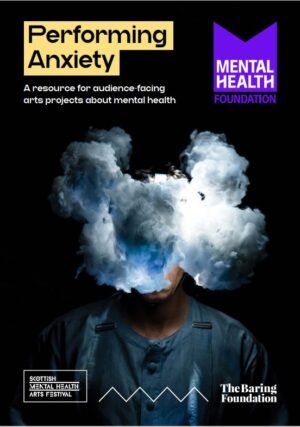We are delighted that the Scottish Mental Health Arts Festival (SMHAF) have today launched Performing Anxiety, an ambitious new good practice resource for live artistic work about mental health.
The resource was funded by the Baring Foundation and produced by Andrew Eaton-Lewis, Arts Officer at SMHAF.
Contributors include Bryony Kimmings, Selina Thompson, the vacuum cleaner, Caroline Horton, Mariem Omari (Bijli Productions), Robert Softley Gale (Birds of Paradise), Ross Mackay (formerly of Tortoise in a Nutshell), Tracy Gentles (Sick Festival), and Nye Russell-Thompson (StammerMouth).
The resource includes an 60-page publication, five-episode podcast, in depth artist interviews, specially commissioned provocations, and an evolving set of good practice guidelines drawing on one-to-one conversations and focus groups with people across the arts industry.
The resource is designed to help artists performing their own work, participatory artists, producers and programmers.
There will also be an online launch and discussion event on Tuesday 16 July, with special guests Mariem Omari of Bijli Productions and Nye Russell Thompson of StammerMouth, winner of the 2023 Mental Health Foundation Fringe Award.
You can book tickets here
Andrew Eaton-Lewis, Arts Programme Officer for the Mental Health Foundation, said:
“In the past few years there has been a huge rise in the number of people making creative projects about mental health, especially in live performance and participatory work. In some ways this is a very positive thing, reflecting a reduction in stigma around mental health, but this new openness to talking about mental health has raised lots of questions about safeguarding and good practice in general.
The Mental Health Foundation has been leading on the Scottish Mental Health Arts Festival for almost 20 years now, and we are frequently contacted by people looking for guidance as to how to make creative projects addressing mental health without jeopardising the mental health of the people involved or affected.
There are numerous artists, producers and programmers who have become experts in this field over the past decade, sometimes through trial and error when making work about their own mental health. We thought it was time to bring together some of the learning in our creative community. It feels especially timely when the arts industry itself is in such a state of crisis that it is having a serious impact on the mental health of many people working in it.”
Questions explored by Performing Anxiety include:
- How do you share very personal mental health experiences with an audience without jeopardising your mental health?
- How do you safeguard the mental health of people you’re working with?
- What is good practice when it comes to consent?
- How effective are check ins, access riders, wellbeing practitioners and other recent mental health initiatives?
- What do producers and programmers need to know when supporting work about mental health?
- What is the role of cultural leaders?
- What needs to change to make the arts a more mentally healthy place to work?
Performing Anxiety is designed to be a living, evolving resource, and SMHAF expects its initial set of guidelines to be constantly updated and expanded in response to feedback, as it shares the resource across a series of live and online events throughout 2024 and 2025 and more voices join the conversation.
